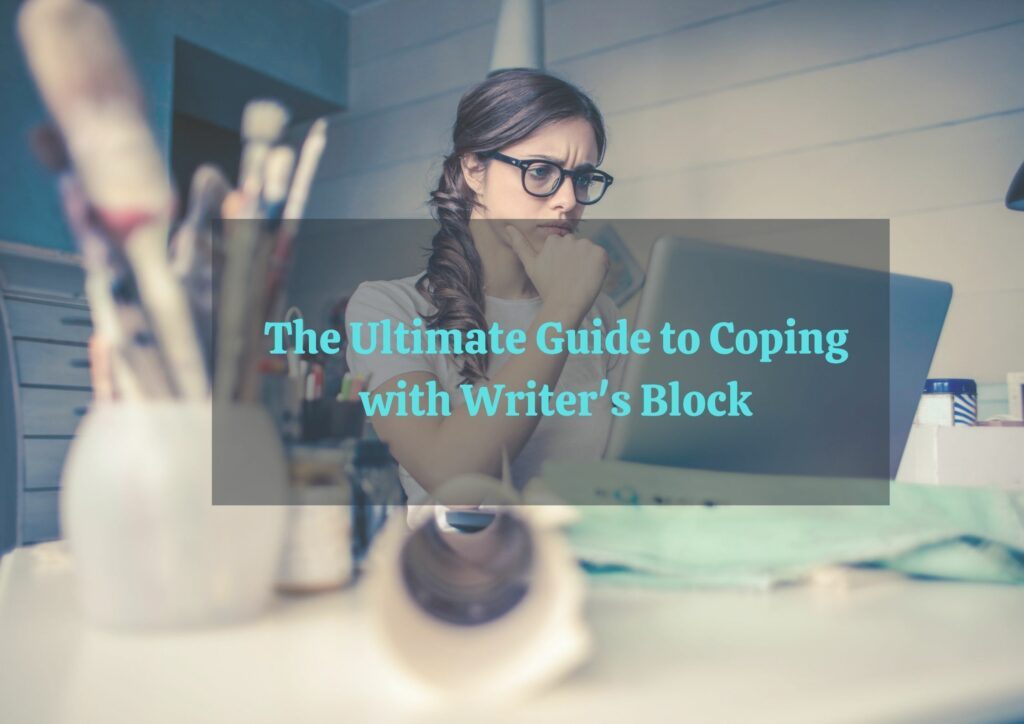
Have you ever found yourself staring at a blank page for a long time, attempting to write but not coming up with the right words? You’re not the only one who feels this way. This is known as writer’s block and affects all authors, from journalists to novelists.
It happens to every writer at some point. It is unavoidable. Writer’s block is a phenomenon that occurs when a writer is unable to come up with ideas to write. It is a problem that every writer faces. Therefore, what is important, is what you do with it.
But before we get into answers, let’s look at the problem. Overcoming writer’s block is a complex process that is very subjective and varies from person to person. It’s about overcoming self-doubt and believing that hard work pays off. In this blog post, you’ll find some writing tips and tactics to help you rekindle your creative impulses.
Causes of Writer’s Block
Depending on the individual, a variety of factors might trigger writer’s block. Some individuals think a lack of creativity or talent causes writer’s block, but this isn’t always the case. Writer’s block is aggravated by self-doubt, for some, if not for everyone.
Here are some common causes that have been reported for causing writer’s block:
- Role of Time – It’s not the appropriate moment to write right now. You may need time to let your ideas simmer for a bit longer before writing them down.
- Apathy – The “rules” of writing limit the writers, and they battle to uncover their creative spark.
- Fear – Many authors are terrified of putting their ideas (and themselves) out there for everyone to see and judge. Fear is one of the main reasons why some people never become authors.
- Anxiety – Writers are concerned that they aren’t up to par.
- Readers – Writers are afraid of being judged on their writing since they don’t want it to be compared to others. Therefore, they end up writing nothing at all.
- Anger – Writers are typically egotistical, and they become enraged if their work remains unappreciated.
- Perfectionism – Before you put pen to paper or touch a keyboard, you want everything to be perfect. You fail to get it perfect in your head, so you never start.
Overcoming Writer’s Block
There are a variety of practical approaches to overcoming writer’s block. You’ve come to the right place if you feel like your writing has hit a brick wall. This article will show you some techniques to break past that barrier and end your writer’s block for good.
1. Find the root of the issue:
Writer’s block isn’t a sign that you’re a “bad writer”, contrary to popular belief; it’s something that practically every writer will experience at some point. However, while most writers have had this experience, the underlying causes might vary greatly.
So, let’s get to the bottom of it: why are you stuck in the first place? Consider the following questions:
- Is there any pressure on me to achieve and compete with other authors?
- Is it possible that I’ve forgotten what my narrative is about or that I’m no longer interested in where it’s going?
- Am I doubting my ability, even though I’ve written a lot before?
- Have I not been writing for so long that the act of writing itself is intimidating?
- Is it just because I’m exhausted and drained?
2. Improve your workplace:
Writer’s block can be removed by making some simple changes in your surroundings. If you have a home office, try working in complete silence. You can shut the door and work. Make your surroundings a place where you desire to be. De-clutter your space, consider displaying fresh flowers or a photograph of something that inspires you.
Consider what time of day you are most productive. Don’t try to write in the morning if you’re not a morning person. Try writing while standing up if you’re always restless. Consider the temperature and noise as well. Writing will be more difficult if you’re uncomfortable or distracted. Put on a cozy sweater and turn on some music if you can’t stand the silence.
3. Create a steady practice:
“Creativity is a habit,” author and dancer Twyla Tharp once said. Some may find this paradoxical; after all, it isn’t creating something that happens naturally and can’t be planned? However, if you only write when you’re “in the mood for creating something creative,” you’re certain to get trapped in a rut. Writing regularly is one of the most effective strategies to push through.
You may already have a pattern in place, but it’s time to shake things up if you have trouble writing. Figure out what days and hours work best for you – if you’re most productive in the mornings, it could be worth getting up a half-hour earlier to get some writing done. If you like low-pressure writing sessions, Sunday afternoons with no other obligations can be a good option. Be consistent with the days and times you choose. The best way to develop a consistent pattern is to attend your scheduled appointments! Give it at least 3-4 weeks, and you’ll notice a difference.
4. Pomodoro technique:
People are most productive in 25-minute increments, according to the Pomodoro technique founder Francesco Cirillo. Set a timer on your phone or download an app (search for “productivity timer”) to apply this technique. Then don’t allow yourself to be disturbed (that means no email, no getting up to get more coffee.) Do whatever it takes to maintain your composure and persevere. Take a break after 25 minutes!
5. Read:
If you’re a voracious reader, your favorite authors can provide you with ideas. Try reading a book before you sit down to write, even if you don’t usually do so. For 10 minutes, read poetry, a book chapter, or a brief essay. This will prepare you to compose your own words—or at the very least emulate those of others.
6. Begin with imperfection:
Perfectionism is common among authors, and it may be especially crippling during the first copy. Writers often have blocks because they place a lot of pressure on themselves to sound ‘perfect’ the first time. Permitting yourself to write imperfectly is a fantastic approach to loosen up and have fun again in a draught. Writers often spend hours trying to develop the ideal phrase to convey a thought. Put “In other words…” and write what you’re thinking, whether it’s eloquent or not, to avoid this useless exercise. You may narrow it later by searching for “in other words” with CTRL+F.
7. 30-minute challenge:
Set a timer for 30 minutes and jot down your day’s activities. When you’ve run out of time, notice what has been distracting you (thoughts, noises, interruptions). Look at how you might remove those distractions from your writing habit on a case-by-case basis. Is your internet, for example, a distraction while you’re writing? You may go entirely manual with a pencil and pad.
Try the same 30-minute challenge the next day, using the skills you learned the day before to eliminate the distractions you noticed. Repeat this technique until you’ve discovered your perfect writing environment.
8. It’s okay to have flaws:
Creating a great first copy will almost certainly result in writer’s block. It will help if you don’t worry about spellings, grammar, or even decent writing while writing your first piece. Just START writing!
Make use of filler words as well. (Yes, an editor will give you the exact opposite advice at the end of the writing process.) But trust me, this works! According to the University of Illinois’ Center for Writing Studies, phrases like “due to the fact that” and “it is vital that” can assist you to get to the notion you’re looking for early on. You can remove them afterward.
9. Find a new perspective:
It is recommended to look at your story from a different angle to get beyond a stumbling block. “How would a minor character describe the scene if they were there?” “Is that a ‘fly on the wall’ or something else inanimate?” Changing the perspective of your story (even if just temporarily) is a fantastic method to break free from mental restraints and get new insight.
Going deeper into the backstory of one of your primary characters may provide you with a greater knowledge of their motivations, which can help you move your plot ahead. Consider what would make your character happy in their life. What are their objectives? What are they prepared to sacrifice to achieve their goals?
Once you’ve answered these general questions, you may apply them to each situation and ask, “What is their purpose in this specific situation?” “What action(s) are they planning to take to pursue it?”
How would your protagonist react if their best buddy asked for a loan if their main purpose was to save money and move away? Or if they started dating moments before they were supposed to leave?
Different personalities and ambitions lead to conflicts that drive your story. If changing your point of view or adding more backstory doesn’t work, go right into the conflict!
10. Find something else to do:
After sitting at your desk for several hours, it might be quite useful to take a break and psychologically “reset” before beginning a new writing session.
Taking a shower, going for a walk, and cooking a healthy meal are things that most people would say are easier than writing a novel, yet they may all help you daydream and discover creative connections that you might otherwise overlook.
The Final Solution
If you’re still not happy, you have one final resort, an ace under your sleeve. The final method for overcoming writer’s block is one you’re already familiar with. You’ve been avoiding it because it’s exactly what you don’t want to hear.
It’s to START WRITING!
Begin somewhere and write a couple of lines. Say whatever you want to and then wait and watch what unfolds. Don’t overthink things or make any elaborate explanations. Simply put, write. It doesn’t have to be elegant or well-presented; it has to be written.
Write for the sheer pleasure of it, because you won’t be able to avoid it. Don’t try to speak or produce anything right now; get some thoughts down on paper. There are no justifications or excuses. Don’t make things any more difficult than it needs to be. Just a few words will be enough. They don’t have to be excellent. They just have to be written. Then you have something with which to operate. From there, you can make adjustments.
One caveat: This method only works if you’re truly blocked, not “empty,” which is a completely different situation.
How to Use AI to Get Rid of Writer’s Block
Do you have any experience in AI writing? It’s all about the clock. In seconds, WriteCream transforms ideas into full-fledged messages or content. It can also assist you in overcoming writer’s block! When you’re stuck on an email or article, it’ll offer you a rough concept of how the final content should look without having to type the bullet points.
The huge strain generally triggers writer’s block we place on ourselves to deliver. While this may be beneficial, you will eventually become anxious and frustrated. The best thing you can do is let go of the stress and focus on what you enjoy.
So stop waiting and start writing with Writecream NOW!

